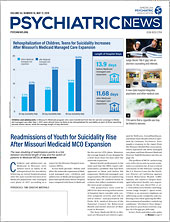APA member Pamela McPherson, M.D., was one of three recipients of the 2019 Ridenhour Prize for Truth-Telling for her role in helping expose conditions in immigrant detention centers at the border and testifying to the long-term adverse effects of detention on children.
She was honored at a ceremony at the National Press Club in Washington, D.C., last month. Her fellow awardees were Scott Allen, M.D., and attorney Scott Shuchart. The event was attended by hundreds of reporters as well as by representatives of government agencies and non-profit human rights organizations.
The Ridenhour Awards—sponsored by Type Media Center, the Fertel Foundation, and the Stewart R. Mott Foundation—were founded in 2003 in memory of Ron Ridenhour, the Vietnam War veteran who exposed the massacre at My Lai to Congress. The awards honor journalists and whistleblowers in government and the private sector who help expose the truth. Allen and McPherson also received a 2019 Human Rights Hero Award from Physicians for Human Rights in April.
McPherson is a mental health subject matter expert, and Allen, an internist, is a medical subject matter expert for the Office for Civil Rights and Civil Liberties (CRCL) at the Department of Homeland Security (DHS). They work on contract for CRCL in different parts of the country. Shuchart was employed as a senior legal advisor in the headquarters of CRCL and resigned his position last October. McPherson is also on the faculty of the Department of Child and Adolescent Psychiatry at Louisiana State University Health Science Center.
The policy of holding families in detention centers was first enacted under President Barack Obama in 2009. In their role as mental health and medical experts, McPherson and Allen had been monitoring family immigrant detention centers since 2014.
In 2015, following criticism of the policy, then-DHS Secretary Jeh Johnson issued an order to phase out the use of detention centers. Under the Trump administration, however, family detention was renewed and extended, with the added element of removing children from parents as a way of deterring migrants from coming to the border.
Shuchart had begun to protest to superiors that the separation of migrant children from their families was illegal even before the directive took effect. He would later describe his efforts in an op-ed published last October in the Washington Post after his resignation from CRCL.
In May last year, the separation policy began making headlines, causing widespread public outrage. The following month President Donald Trump signed an order rescinding the policy.
But the practice of detaining families continued. With legal consultation from the Government Accountability Project, a nonprofit organization dedicated to providing legal consultation to whistleblowers, McPherson and Allen wrote a letter to Congress last July, describing the poor condition of family residential facilities, lack of translators, and inadequate medical staffing. In November 2018, McPherson, Allen, and Shuchart were featured on “60 Minutes.”
In remarks during the award ceremony last month, Shuchart said he believes children may still be separated from their parents at the border. And Allen said detention of families is ongoing and should be of concern to Americans. “Our work is not done,” he said. “Our efforts are ongoing.”
Introducing McPherson and her colleagues at the ceremony last month, the immediate past president of the American Academy of Pediatrics, Colleen Kraft, M.D., called the practice of family separation “government-sanctioned child abuse.”
Recalling a visit to the border, Kraft said, “I will never forget walking into a roomful of toddlers [who had been separated from their parents]. You know what toddlers are normally like—noisy and rambunctious. This room was perfectly quiet.”
At the ceremony, McPherson said what she and her colleagues saw at the border in family detention centers was searing. “Our firsthand experience, informed by science, left no doubt that these actions could have devastating medical and mental health consequences for children.”
Quoting the late Nelson Mandela, McPherson said, “There can be no keener revelation of a society’s soul than the way it treats its children.” She added, “Sometimes it feels like America has lost her soul.”
McPherson told Psychiatric News that psychiatrists and other physicians should know there are legal mechanisms to protect whistleblowers in vulnerable positions. She said the legal help of the Government Accountability Project was invaluable. “We would have made all kinds of mistakes if we had spoken out on our own before obtaining legal counsel,” she said.
Dana Gold, senior counsel with the Government Accountability Project, said there are categories of information protected by federal law that whistleblowers might seek to disclose, free from the threat of reprisal. These include information an individual may reasonably believe reflects a violation of law, rule, or regulation; gross mismanagement; gross waste of funds; abuse of authority; and a substantial and specific threat to public health or safety.
“The disclosures made by all three whistleblowers clearly rise to this level of seriousness,” Gold told Psychiatric News. “We were able to wrap Drs. McPherson and Allen in their rights, so we could say to the administration, ‘They are protected. If you try to do anything to them, you will be legally liable.’ ” ■
Information about the Government Accountability Project can be accessed
here. The letter written to Congress by McPherson and Allen is available
here. The op-ed by Shuchart is posted
here.

